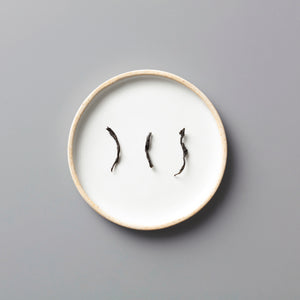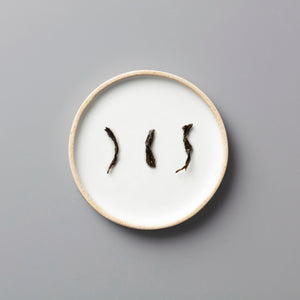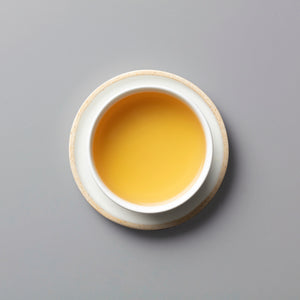Your Cart is Empty



Sold out
PANLAN QUE SHE | yancha oolong
$5.00 - $72.00
PANLAN QUE SHE is a yancha ("rock tea") from Yong'an county, Fujian province, China. This lot from Panlan garden in lower Wuyi is of que she ("sparrow tongue") material, a late-budding cultivar with relatively low yield per season. A descendant of da hong pao, one of the 4 mingcong cultivars (cultivars originally from Wuyi), que she produces small, narrow leaves, hence the name. Because que she trees are low output and the smaller leaves require a careful hand in processing, the cultivar is somewhat unpopular among yancha producers; that said, traditionalist masters like Shan Zhong cultivate and produce que she for its exquisite flavors and abundant qi ("energy"), both of which this lot is rich in. As a matter of principal we don't weigh in on the health effects of tea (making only the occasional reference to cha qi, or "tea energy", a Chinese term for the physical effect a tea has), but que she is specifically prized for it, and there is something to say for slow-growing tea in a harsh microclimate like Panlan. In all, this is a nuanced tea perfect for the seasoned yancha veteran looking to experience something unique.
As with our qi lan, 105, and da hong pao, this lot was hand-produced from beginning to end. Shan's que she trees were plucked in October, sun-withered, manually bruised, pan-fried over a wood fire to fix, rolled to shape in cloth sacks, and charcoal roasted at low temperature in 3 rounds before being rested in bamboo baskets. Unlike the qi lan and DHP, Shan is especially ginger with his que she harvests, as there's very little of it and the leaves can't be roasted as aggressively as larger cultivars. As such this lot is middle-oxidized with a light—but very much present—roast.
Que she's finer points are not as obvious as more popular yancha, and at a usually steep price point, this tea rarely makes an appearance in the west. But that's our thing: work with incredible producers to make unconventional and inaccessible teas available to you. Fans of Panlan teas will know we make noise about Shan's zhoucha ("island tea") garden all the time; his teas outpace their fancier (and astronomically more expensive) cousins further to the north. For the yancha connoisseur, this tea is not to be missed. Flash steep in medium-hot water for notes of ______ and ______. You fill in the blanks. This yancha has to be tasted to be understood.
vintage —autumn '21 (roasted winter '21)
style — yancha ("rock tea") [que she]
cultivar(s) — que she ("sparrow tongue")
region — Yong'an, Fujian, China
locale — Panlan tea farm
elevation — 1000 meters
producer — Shan Zhong
nomenclature —que (奇) —"sparrow" | she (兰)—"tongue"
STEEPING PARAMETERS
(use freshly boiled spring water)



